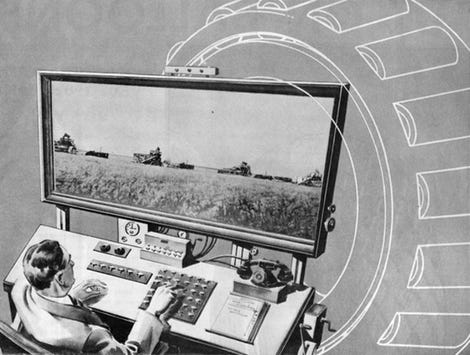|
You
can also view the message online
|
||||||||||||||
 Châtenay-Malabry (FR - 92290), May 11, 2020 EFITA newsletter / 929 - European Federation for Information Technology in Agriculture, Food and the Environment To unsubscribe this newsletter, please contact me directely: guy.waksman(a)laposte.net if this link Unsubscribe does not work. Please note that I changed the presentation of the links that are embedded in the name of the web service. 
To correspond with me (GW), please use this address: guy.waksman(a)laposte.net To subscribe the efita newsletter (please ask your friends and colleagues to test this link) Efita Newsletters subscription Weekly newsletters about ICT in Agriculture in English and French Both newsletters have around 14000 subscribers. >>> Last weekly EFITA Newsletters in English (created in 1999) Efita Newsletters >>> Last weekly AFIA Newsletters in French (created 20 years ago in 1997) Afia Newsletters Around 15% of subscribers have a look on these newsletters. A rather normal rate… The archive for the last years are available on the AFIA web site. >>> Last edition of "Du côté du web et de l'informatique agricole 20 / 2020" du 7 mai 2020 >>> >>> Statistics about the previous issue of the efita newsletter dated May 4, 2020 How we saw the future yesterday?
Archives of our newsletters in French and English Voir Afia Voir Efita
Steven Pinker: 'Who, Me Controversial?' Controversial? Leftist and optimist and realist = exceptional Q&A: COVID-19 pandemic – impact on food and agriculture See FAO OECD: COVID-19 and the Food and Agriculture Sector: Issues and Policy Responses The COVID-19 pandemic is a global health crisis that is having devastating impacts on the world economy. How damaging these impacts turn out to be for the food and agriculture sector will depend on policy responses over the short, medium and long term. This brief details some of the major challenges and discusses what policy makers can do to meet them. See oecd-ilibrary.org Good old days (?????): The Two Mothers, 1889, by Giovanni Segantini (1858-1899) Agricultural trading 4.0 – or only hot air? By Dr Christian Bickert Trading platforms are worth a try. Particularly so for larger farm businesses already equipped with own weighbridge, storage facilities for separated grain qualities and rapid loading plant. For such participants, new business relationships in other regions could certainly be interesting. Whether such an approach would always pay remains to be seen. For farmers, savings in transactions and costs are less important in this respect. After all, it’s just as quick to phone the local trader than to spend time checking tenders placed in the Internet. See dlg.org Farm Tech investment up 370% in 6 years. How will Covid-19 impact 2020 trends? By Richard Martyn-Hemphill Farm Tech startup investment bucked global venture capital markets across sectors by increasing 6.8% year-over-year to $4.7 billion in 2019; some 370% more than in 2013. Farm Tech startups raised that sum across 695 deals with 940 unique investors. F&A Next Presents Eight ‘Next Heroes in Food- & Agtech 2020’ F&A Next, in cooperation with Foodbytes! by Rabobank, proudly presents the eight most promising startups that have been selected as this year’s ‘Next Heroes in Food- & AgTech’. Next May 13, four FoodTech and four AgTech startups will pitch their innovations during a (free) live webinar of F&A Next to an international audience of agrifood investors, corporates, media and fellow entrepreneurs. See fanext.com
Monitoring crop emergence during COVID-19 pandemic What does the COVID-19 pandemic mean for farming? No pressure, but it means that this year’s crop is more critical than ever. There is already mounting concern about what the crisis will mean for the food supply chain and farm labour. Why growers who embrace and leverage technology will outperform those who do not? See futurefarming.com Connectivity: Myriota to expand IoT connectivity services Australian satellite connectivity company Myriota has raised $28 million AUD in Series B funding. data See futurefarming.com Conservis integrates John Deere and FieldView data Growers can seamlessly integrate as-applied and yield data into a unified view of their operation. See futurefarming.com Business. Rabobank: data offers farmers new business models Rabobank says precision agriculture can be an instrument for new business models for farmers. See futurefarming.com
Vertical Farming: Brazilian big cities embrace urban farming Brazilian large cities have started urban farming projects with the goal to produce fruit and vegetables in a sustainable way. Future Farming took a look a... See futurefarming.com Global adoption of 25 farming practices could reduce CO2 emissions by 4.6 GT by 2025 – new McKinsey report, by Lauren Stine 1. Zero-emissions on-farm machinery and equipment 2. Variable-rate fertilization 3. Reduced nitrogen application in China and India 4. Dry direct seeding 5. Low- or no-tillage 6. Improved equipment maintenance 7. Improved fuel efficiency of fishing vehicles 8. Improved rice paddy water management 9. Improved rice straw management 10. Improved animal health monitoring and illness prevention 11. Feed-grain processing for improved digestibility 12. GHG-focused breeding and genetic selection 13. Livestock nutrient use efficiency 14. Optimal rice varietal selection 15. Nitrogen-fixing rotations 16. Improved fertilization of rice 17. Nitrogen inhibitors on pasture 18. Improved fertilization timing 19. Controlled-release and stabilized fertilizers 20. Animal feed additives 21. Anaerobic manure digestion 22. Technologies that increase livestock production efficiencies 23. Animal feed mix optimization 24. Conversation from flood to drip or sprinkler irrigation 25. Specialty crop nutrition amendments See agfundernews.com Good old days (?????): Paysanne au bassin dans un jardin, par Vincent van Gogh (1853-1890) Between factual logic and psycho-logic, by Johannes Simons and Carl Vierboom Agriculture and sustainability are complex themes with many related aspects to be considered for any fact-based discussion on the subjects. And even a general understanding of the associations involved requires some education on the subjects as well as time and energy spent in learning. It’s therefore no surprise that »normal« consumers don’t have this required background knowledge, or at least not enough of it. What is a surprise is the oft-heard opinion in agricultural discussions that all that’s needed for a layperson, the consumer, to understand the facts is a simple explanation. 1 – Those lacking the necessary knowledge are unable to appreciate arguments. 2 – Those lacking the necessary knowledge must decide whom to believe. 3 – Those lacking the necessary knowledge are hard to completely convince. 4 – Those lacking the necessary knowledge tend to fear many things. 5 – Those with an opinion don’t necessarily have a lot of knowledge. 6 – Those lacking the necessary knowledge still think they can define good agricultural practice. 7 – Those lacking the necessary knowledge find it hard to assess consequences. 8 – The decisive difference is therefore: psycho-logic instead of factual logic. See dlg.org Kenya pushes GMO cotton farming to meet soaring demand for masks See allianceforscience.cornell.edu Irrigation expansion could feed 800 million more people A team of Italian scientists from Politecnico di Milano, the University of California of Berkeley and the University of Amsterdam published yesterday in the prestigious journal Science Advances a study on the global geography of agricultural water scarcity. The study finds that there is enough locally available water to expand irrigation over 140 Million hectares of agricultural lands, currently not irrigated due to socio-economic reasons. The study shows that 800 million more people could be fed by sustainably expanding irrigation over economic water scarce croplands See mynewsdesk.com Around 80 per cent of the world’s population relies on imported food by Siobhán Dunphy The majority of the world’s population live in countries that are dependent on, at least to some extent, imported food, according to a new study published on 17 April in Nature Food. This could intensify vulnerabilities during the ongoing COVID-19 pandemic as supply chains are disrupted. Globalisation has revolutionised the food industry. Indeed, centralised […] See europeanscientist.com
Covid 19 and the elephant in the room, by Aseem Malhotra Obesity and chronic metabolic disease is killing COVID -19 patients: now is the time to eat real food, protect the NHS and save lives. A healthcare system issue Last week I inquired as to how a close friend of mine, a director of research and a senior clinical doctor in one of New York’s’ busiest […] See europeanscientist.com/ Could better dietary choices prepare us for the world after COVID-19? By Jean-Paul Oury As the pandemic continues to wreak havoc, we provided a rapid overview in our last editorial of the most efficient measures for dealing with the pandemic. One message stands out from the numerous recent contributions that we have published on the topic of COVID-19: “an ounce of prevention is worth a pound of cure”. And […] See europeanscientist.com Good old days (?????): Il lavoratore della terra, 1886 (charcoal), by Giovanni Segantini (1858-1899) Short COVID jokes 1. This quarantine got everybody home. My dad finally came home with the pack of cigarettes he went to get thirty years ago. 2. Cop: Sir, I can smell alcohol in your breath. Me: That’s because you’re not respecting social distancing. 3. What if this quarantine is just the aliens fattening us up for the big harvest? 4. All those people panic buying, make sure you stock up on condoms, so you don’t produce any more idiots. Good old days (?????): Alpine Triptych: Death, 1898–99, by Giovanni Segantini - The Yorck Project (2002)
The distribution of this efita newsletter is sponsored by vitisphere.com Please, contribute to the content of your efita newsletter, and advertise your events, new publications, new products and new project in this newsletter. Without your support, it will not survive! Contact: Guy WAKSMAN E-mail: guy.waksman(a)laposte.net To read this newsletter on our web site See Afia The archives of this newsletter See Afia About the EFITA mailing list You can use the efita moderated list (> 15000 subscribers) to announce any event / product / web site / joke (!) related to IT in agriculture, environment, food industry and rural areas. If you want to subscribe a friend, please fill in his form. If you do not wish to receive our messages, please fill in the following form... |






.jpg)

